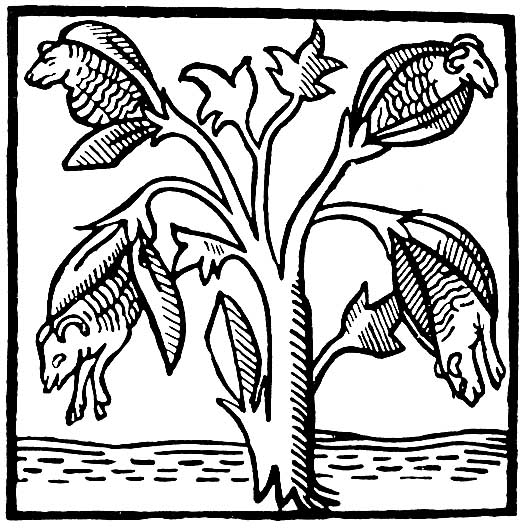Barometz (The Vegetable Lamb)
When cotton was first introduced to Europeans in medieval times, they were mystified. What was the source of this marvelous material? Theories abounded. For a time, the source was thought to be ‘the Vegetable Lamb of Tartary’—a plant with tiny sheep on stems bowing down and grazing the undergrowth. One can only imagine how they thought all those tiny sheep were shorn.
From The Practical Spinner’s Guide: Cotton, Flax, Hemp, Stephenie Gaustad, 2014
My wife Jessica showed me this passage, and we obviously had to know more. The creature’s wikipedia page quoted some extraordinary verse by Dr. Erasmus Darwin (one of those Darwins):
E’en round the Pole the flames of love aspire,
And icy bosoms feel the secret fire,
Cradled in snow, and fanned by Arctic air,
Shines, gentle borametz,1 thy golden hair
Rooted in earth, each cloven foot descends,
And round and round her flexile neck she bends,
Crops the grey coral moss, and hoary thyme,
Or laps with rosy tongue the melting rime;
Eyes with mute tenderness her distant dam,
And seems to bleat – a vegetable lamb
(Listen, because I am telling you that there is a two-volume book of rapturous poetry about botany, by Darwin’s grandpa, available for free on Project Gutenberg: The Economy of Vegetation and The Loves of the Plants.)
I decided that this lovely misconception needed to be set to music. It’s in iambic pentameter, so I looked through Hymnary by meter and found Magda by Ralph Vaughan Williams to be suitably tender.
So! Here is the sheet music (revision 5) if you would like to sing about this earthy plant-beast. Maybe you can use it in a concert about… misconceptions? Exoticism? Evolution? Fabric? Sheep?
The sheet music is licensed CC-BY 4.0; I would love to know if you use the music, my email address is in the footer. Error reports also welcome.

Engraving by Sir John Mandeville, 14th century
-
Borametz, Barometz, and Borometz all seem to be valid names. Also Scythian Lamb. ↩